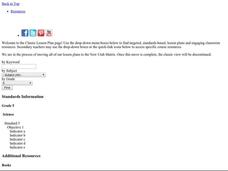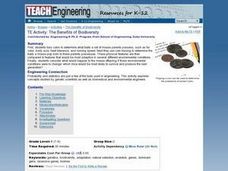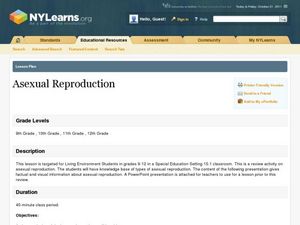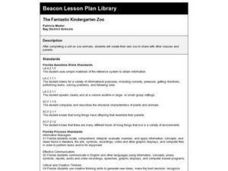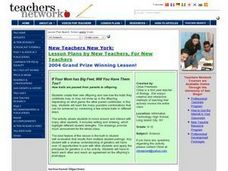Curated OER
Why Are Some Traits Very Common?
In this traits worksheet, students will brainstorm 2 examples of common traits and then determine why those traits are very common. This worksheet is a graphic organizer.
Curated OER
A Sputtering Image
Learners explain the role of genes in heredity. In this biology instructional activity, students predict the offspring's genotypes and phenotypes using the Punnett Square. They compute the probability of genotypes and phenotypes.
Curated OER
What is Genetics?
In this biology instructional activity, 9th graders name two forms of the trait for seed shape observed by Mendel. Then they determine the percentage of the possible types of offspring that have the same genotype as the parents. Students...
Curated OER
Rock, Paper, Scissors
Fifth graders explore genetic traits. In this genetic traits lesson, 5th graders investigate dominant and recessive traits. Students identify similar traits between a parent organism and its offspring.
Curated OER
Using the Internet: Punnett Squares
Seventh graders discuss their own genetic traits. Using computers, they research the creation of Punnett Squares. They preform online experiments with peas, predicting the appearances of the offspring. They determine how genetic traits...
Curated OER
Punnett Squares
Fifth graders examine how traits are passed to their offspring using Punnett Squares. They demonstrate how a Punnett Square works by physically moving around boxes taped on the floor, representing the different traits of chicks and...
Curated OER
Genetics
Students explain the difference between dominant and recessive genes, identify what causes differences in the traits of parents and their offspring, and explain how sex is determined. They will also improve their reading and...
Curated OER
Heredity Worksheet: Blood Type
In this genetics learning exercise, students use Punnett squares to determine the possible genotypes of offspring based on blood type. This learning exercise has 6 problems to solve.
Curated OER
The Benefits of Biodiversity
Students examine the concept of biodiversity. They toss coins to determine what traits mouse parents have and the babies traits as well. They predict what would happen to the baby mice if the traits of the parents were different.
Curated OER
Asexual Reproduction
Sixth graders investigate how asexual reproduction produces single-parent offspring. They use plants and yeast to demonstrate vegetative propagation and budding in a laboratory. Students draw five different types of asexual reproduction.
Curated OER
The Fantastic Kindergarten Zoo
First graders create their own zoo to share with other classes and parents. Groups create displays for the animals. Have each group brainstorm how they create a display for their animal.
Curated OER
Square Dancing
Fourth graders investigate the concept of using punnett squares in the determination of the offspring.They collect drawings and pictures and create a collection for student science journals.
Curated OER
Heredity Worksheet #4
In this genetics worksheet, students use a pedigree to determine if any of the offspring carry a recessive trait. This worksheet has 5 fill in the blank and 5 short answer questions.
Curated OER
Genetics: Who are you?
Study, manipulate, and research genetic traits. Discuss how genetic traits are passed from one generation to another. Classmates explore how they look like their parents and debate whether or not they can do anything about it? They...
Curated OER
Traits
Sixth graders consider heredity. In this science lesson plan, 6th graders gain an understanding of certain physical traits are inherited from their parents through the genes.
Curated OER
Understanding Greek Mythology
Students explore the role of Greek mythology in ancient Greek life. They discuss the origins of the Greek gods and goddesses, conduct Internet research, and present a project in the form of a dialogue between a Greek god and a human...
Curated OER
Pedigrees
Students examine various inheritance patterns using pedigrees. In groups, they predict what might happen to the offspring of a woman with normal vision and carries the recessive allele gene. They determine the genotypes of the man and...
Curated OER
Animals and Environments
Students listen to stories and identify animals and their young. In this animals lesson, students view videos about farm animals and create illustrations to show how animal babies change over time. Students discuss how they care for...
Curated OER
Cell Reproduction and Inheritance
Students determine their inherited characteristics from their parents. In this biology lesson plan, students study the life of Mendel using an interactive website. They differentiate dominant and recessive characteristics.
Curated OER
Dad's Magnetic Personality
Learners create a gift honoring Father's Day. In this Father's Day lesson, students examine the meaning of fatherhood and explore the history of this tradition. Learners create a picture collage over a template of their father's initials.
Curated OER
Genes
Fifth graders learn of how genes transfer information from one generation to the next. They flip a penny and circle traits to create an offspring. Next, they will draw a picture using the traits circled with colored pencils on the "Who...
Curated OER
If Your Mom Has Big Feet, Will You Have Them Too?
Students describe and apply the Mendellian principles of genetics, focusing predominantly on dominant and recessive genes. They demonstrate how two parents contribute genes and how those genes appear in their offspring. They describe...
Curated OER
Punnett Squares/Genetics
Ninth graders complete a monohybrid cross and a dihybrid cross. In this biology activity, 9th graders predict the traits of offspring using the Punnett square. They differentiate recessive and dominant genes.
Curated OER
Internal vs. External Fertilization
Pupils distinguish between internal and external fertilization. In this biology lesson plan, students classify organisms according to their reproductive method. They simulate the role of parents who reproduce either internally or...
Other popular searches
- Baby Animals and Parents
- Animal Babies and Parents
- Animal Parents and Offspring
- Parents and Offspring Names





